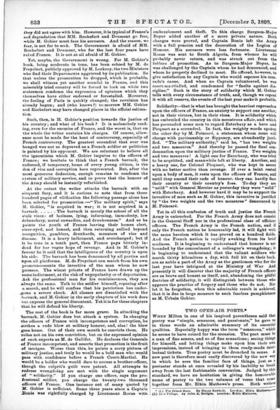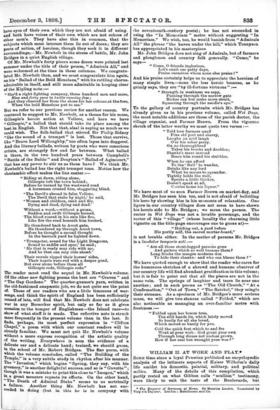TWO OPEN-AIR POETS.*
WHEN Milton in one of his inspired parentheses said that poetry was "simple, sensuous, and passionate," he gave us in three words an admirable summary of its essential qualities. Especially happy was the term "sensuous," which he seems to have coined for the occasion. The poet must be a man of fine senses, and so of fine sensations; seeing things for himself, and letting things make upon him their own impressions, instead of bringing to them ready-made intel- lectual tickets. True poetry must be drenched in sense. A new poet is therefore most easily discovered by the new way in which he sees the familiar face of things, just as a poetaster stands at once revealed by his inability to break away from the last fashionable convention. Judged by this standard, we have no hesitation in giving the honourable name of poetry to the two volumes of verse that come together from Mr. Elkin Mathews's press. Both writer's • (1.) The Island Rau. By Henry Newbolt. Lnrdnn : Elkin Mathews.-- (2.) la a Village. ay John A. Bridges. London.: Eikin Mathews.
have eyes of their own which they are not afraid of using. and both have voices of their own which are not echoes of other men's. They have also this in common, that the subjects which most interest them lie out of doors; they are poets of action, of heroism, though they seek it in different surroundings,— Mr. Newbolt in the stress of battle, Mr. John Bridges in a quiet English village.
Of Mr. Newbolt's forty pieces some dozen were printed last summer under the title of their proem, "Admirals All," and were welcomed at the time in these columns. We congratu- lated Mr. Newbolt then, and we must congratulate him again,
on his "Ballad of the Bold Menelaus," with its rattling chorus, admirable in itself, and still more admirable in keeping clear of the Kipling note:— "She'd a right fighting company, three hundred men and more, Nine and forty guns in tackle running free ;
And they cheered her from the shore for her colours at the fore, When the bold Menelaus put to sea."
But we refer to our previous review for another reason. We ventured to suggest to Mr. Newbolt, as a theme for his muse, Gillespie's heroic action at Vellore, and here we have " Gillespie," a ballad that should take its place among the best in English. Not that that, alas! is saying as much as we could wish. The folk-ballad that stirred Sir Philip Sidney "like the sound of a trumpet" is lost. Those that survive, like "Brave Lord Willoughby," too often lapse into doggerel. And the literary ballads, written by poets who were conscious artists, are strangely few and far between. What ballad is there, in the two hundred years between Campbell's "Battle of the Baltic " and Drayton's " Ballad of Agincourt," that has any power to stir us as these have ? We think Mr.
Newbolt's ballad has the right trumpet tone. Notice how the choriambic effect makes the line canter :—
"Riding at dawn, riding alone,
Gillespie left the town behind ; Before he turned by the westward road A horseman crossed him, staggering blind.
' The Devil's abroad in false Vellore, The Devil that stabs by night,' he said, 'Women and children, rank and file, Dying and dead, dying and dead.'
Without a word,—without a groan, Sudden and swift Gillespie turned, The blood roared in his ears like fire, Like fire the road beneath him burned, He thundered back to Arcot gate, He thundered up through Arcot town, Before he thought a second thought In the barrack yard he lighted down.
Trumpeter, sound for the Light Dragoons, Sound to saddle and spur,' he said; ' He that is ready may ride with me, And he that can may ride ahead.'
Their rowels ripped their horses' sides, Their hearts were red with a deeper goad, But ever alone before them all Gillespie rode, Gillespie rode."
The reader must read the sequel in Mr. Newbolt's volume.
Of the other new fighting poems the best are "Craven" and "The Gay Gordons." The quarter-gunner's yarn, written in the old-fashioned anapestic jolt, we do not quite see the point of. Those of our readers who are a little timorous of war- songs, and think the spirit of England has been sufficiently mused of late, will find that Mr. Newbolt does not celebrate war in any Berserker spirit, but only so far as it gives occasion to the temper of Englishmen—the Island race—to show of what stuff it is made. The reflective note is struck more frequently in the present volume than in the last. It finds, perhaps, its most perfect expression in " Clifton Chapel," a poem with which our constant readers will be already familiar. We must not quit Mr. Newbolt's volume without a more express recognition of the artistic quality of the writing. Everywhere is seen the evidence of a delicate ear and a delicate hand ; trained, we should guess,
In the school of Mr. Robert Bridges. The fine poem, with which the volume concludes, called "The Building of the Temple," is a very subtle study in rhythm after his manner.
The "Invasion," which begins "Spring, they say, with his greenery," is another delightful success, and so is " Gavotte"; though it was a mistake to print this close to "Imogen," which in a great measure repeats its effects. On the other hand, "The Death of Admiral Blake" seems to us metrically a failure. Another thing Mr. Newbolt has not suc- ceeded in doing (but in this be is in company with the seventeenth-century poets); he has not succeeded in using the "In Memoriam " metre without suggesting "In Memoriam." We wish, too, he would banish from "Admirals All" the phrase " the haven under the hill," which Tennyson has appropriated in his masterpiece-
Mr. John Bridges does not sing of Admirals, but of farmers and ploughmen and country folk generally. "Come," he says- " Come, 0 friends inglorious,
Let's exalt our petty days, Praise ourselves whom none else praise I"
And his praise certainly helps us to appreciate the heroism of
many simple lives,—none the lees heroic because, as he grimly says, they are " by ill-fortune virtuous " :- " Strength in weakness we espy, Pushing through the narrow gate Riches can but make more strait,
Squeezing through the needle's eye."
To the gallery of country portraits which Mr. Bridges has already given us in his previous volume, called Wet Days, the most notable additions are those of the parish doctor, the village organist, and Farmer Brown. From the vigorous sketch of the latter worthy we must quote two verses :-
"Told how farmers quaff
Fine old port and sherry, Laughs an acid laugh O'er his sober perry.
On no thoroughbred Takes his brooks and doubles; Shanks's mare instead Bears him round his stubbles.
When he can afford To the Bull' to wander, Drinks like any lord What he means to squander. Tightly holds the wall, Speaks a little thicker, Doesn't speak at all, Carries home his liquor."
We have most of na seen Farmer Brown on market-day, and Mr. Bridges has seen him too, and is not afraid of belittling his hero by showing him in his moments of relaxation. One figure in our country villages does not seem to have shown his heroic side to Mr. Bridges ; we mean the parson. The rector in Wet Days was not a lovable personage, and the rector of this " village " (whose locality the charming little vignette on the title-page encourages one to guess at)—
" Holding out, a yard before
His portly self, the sacred mortar-board,"
is not lovable either. In the matter of parsons Mr. Bridges is a laudator temporis acti
" Are all those stout-legged parsons gone And gaiters which so well became them?
Long frocks the meagre moderns don To hide their shanks: and who can blame them "
We have quoted enough to show that the reader who cares for the humorous sketches of a shrewd and humane observer of our country life will find abundant gratification in this volume; but it is fair to point out that all the pieces are not in the
same vein. The springs of laughter and tears lie near one another ; and in such poems as "The Old Church," "At a Confirmation," "Out of Town," "The Satchel," they mingle their streams. As a specimen of Mr. Bridges's more serious muse, we will give two stanzas called " Folded," which are also noticeable as managing an over-familiar metre with freshness :— " Folded upon her bosom true,
The still hands lie, which lately moved
So busily for all she loved, Which moved so busily for you.
Cold the quick feet which to and fro
Went at your wish : God grant your own Through long disuse not useless grown. How if her zeal but wrought your woe ?"























































 Previous page
Previous page